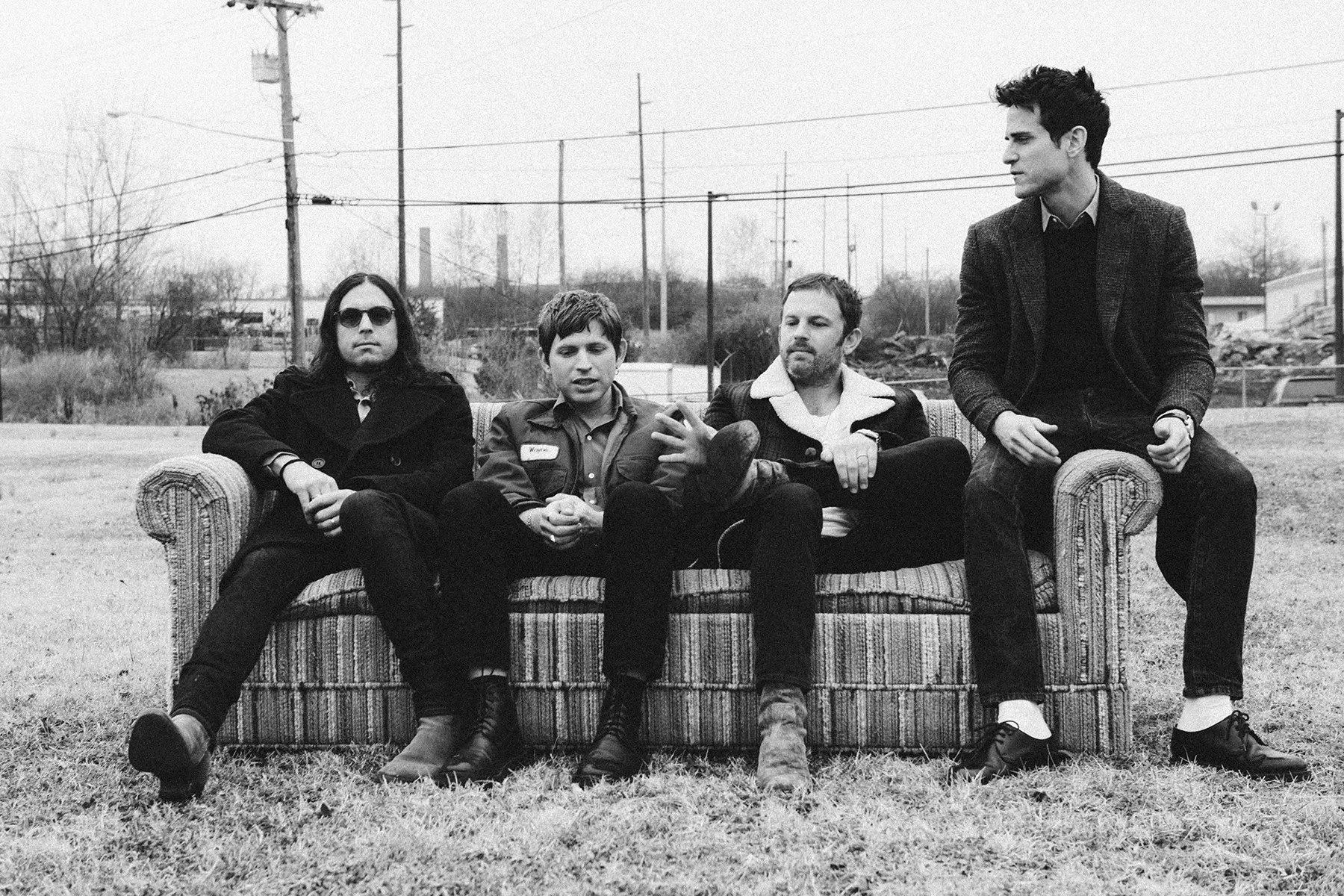
Matthew Followill

Audio By Carbonatix
Myth is as essential to rock music as guitar strings and amplifiers. Particularly for new artists, stepping into the spotlight with a readymade narrative carries as much weight as the quality of the songs or the originality of their presentation.
Kings of Leon, whose gnarly, murky and arresting debut LP, Youth & Young Manhood, turned 20 years old last Friday (its UK release), was a textbook example of this music industry truism in effect. The Followill brothers – Nathan, Jared and Caleb – and their cousin, Matthew, formed a band in 1999, following a childhood spent touring the rural South with their parents, one of whom, Ivan, was a Pentecostal preacher.
The pivot from humid, holy rolling tent revivals to sweaty, sold-out rock concerts is well-worn – a quick scan of rock’s formative decades in the 1950s and 1960s is littered with those who divined the transferable skills in saving souls – but as the band was breaking out in the early aughts, it was pure catnip to music journalists, particularly those in Europe.
The Guardian raved: “Using and abusing passionate gospel, country sweetness and filthy guitar licks, the Kings of Leon are the kind of authentic, hairy rebels the Rolling Stones longed to be.” NME called the record one of “the best debuts of the past 10 years.”
It was a more auspicious debut across the Atlantic, as the U.S. at the time was in thrall to gleaming R&B and pop confections – as a reminder, 2003’s hit singles included 50 Cent’s “In da Club,” Sean Paul’s “Get Busy” and Eminem’s “Lose Yourself” – and the default rock mode of that moment was more milquetoast than mysterious: 3 Doors Down, Matchbox Twenty and Jason Mraz were in heavy rotation.
But that’s another hallmark of rock music: What is fashionable in one moment can quickly become otherwise. The confident artistry displayed across the Ethan Johns and Angelo Petraglia-produced tracks – the Followills cut the songs in California and Tennessee – makes the then-popular descriptor “Southern-fried Strokes” feel as misguided as it was reductive.
That’s largely because Kings of Leon are far more hedonistic – lyrically and musically – than most of what emanated from New York City during that same time. (A place that was, incidentally, also home base for a cluster of bands more than a little familiar with the construction and deployment of myths.)
Taken together with the religious backstory, there’s a sense of precisely what the title promises – a heedless lusting, a restless insatiability for both the freedom of the road and those who offer comfort along the way.
There’s a familiarity to these songs – faintly rustic, lightly grimed and with Caleb Followill’s mush-mouthed yowl pierced with greasy guitar riffs – that endeared them to a fan base that has only grown with time’s passage.
“Another dirty bird ain’t givin’ out a taste/In the black of the night ’til the red morning light,” goes a line on the album’s opener, “Red Morning Light.”
“You want it, she’s got it/Molly’s chambers gonna change your mind/She’s got your, your pistol,” goes the nearly shout-sung chorus of hit single “Molly’s Chambers,” a particularly un-subtle sexual metaphor.
Especially for an act that would later have a massive hit titled “Sex on Fire,” the preoccupation with carnal desires provides the band with a tension it can deploy at will – the past rooted in faith, the present preoccupied with sins of the flesh.
It’s to the band’s credit that it has refused to lean too heavily in one direction or another over the course of its two-decade career.
Kings of Leon remained a critical favorite and significant live draw outside the U.S. for the five years prior to 2008’s Only by the Night, the band’s fourth LP and home to “Sex on Fire” and “Use Somebody.” Both songs helped propel the record’s sales north of six million copies worldwide and earned the group a trio of Grammy Awards, including Record of the Year.
Those highs would soon be followed by a series of lows – another unavoidable component of a career in rock music. In 2010, the band was driven from the stage during a performance in St. Louis by some aggressively incontinent pigeons. A year later, an audibly intoxicated Caleb Followill departed from the then-Gexa Energy Pavilion stage, forcing the band to pull the plug after less than an hour.
A hiatus of about 18 months was not far behind, and the band would eventually regain its footing, releasing its eighth studio album, When You See Yourself, in 2021, which spawned hit singles “The Bandit” and “Stormy Weather.”
Occasionally, bands will succumb to the hype – buying into the myth, if you will – and sometimes implode, becoming more enamored of the role of rock star than doing the work required to stay one. The attitude, as ever, is far easier to maintain than the art.
Kings of Leon is that rare act that managed to use the power of myth to catapult itself to the front ranks of early aughts rock bands, then use the muscle of its music to build and expand its audience. What read as nervy on the release of Youth & Young Manhood now simply feels like confidence.
Enduring as rock stars – or barring that, as an act popular enough to still be touring sheds and arenas over two decades into a career – is no small feat, especially over the last couple decades, as the music business has convulsed, contracted and undergone multiple seismic shifts.
Perhaps Kings of Leon simply traded one myth for another, shrugging off the mantle of church-bred rock gods and assuming the role of confident, compelling elder statesmen, stewards of the sort of career many new bands now – armed with any kind of pre-release myth or not – will be hard-pressed to emulate.